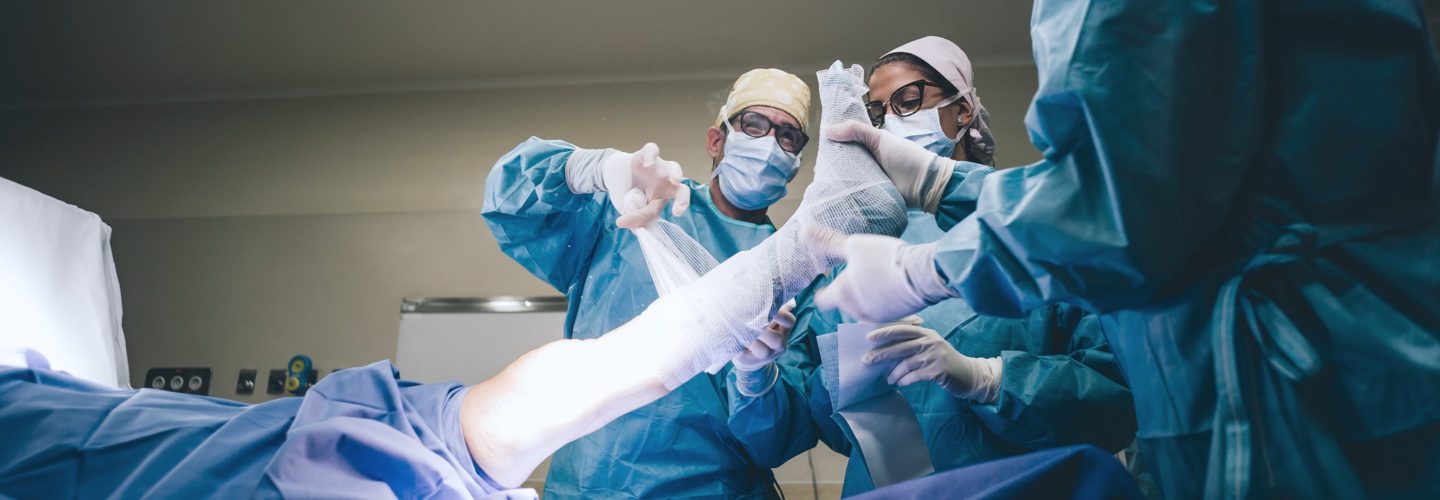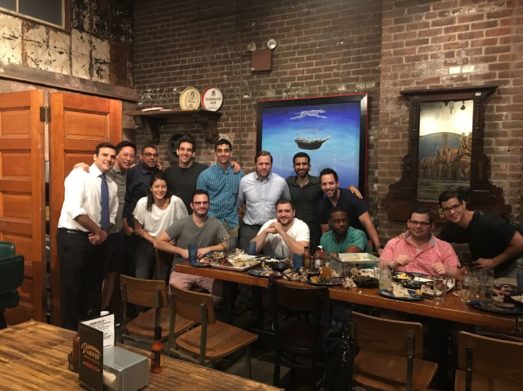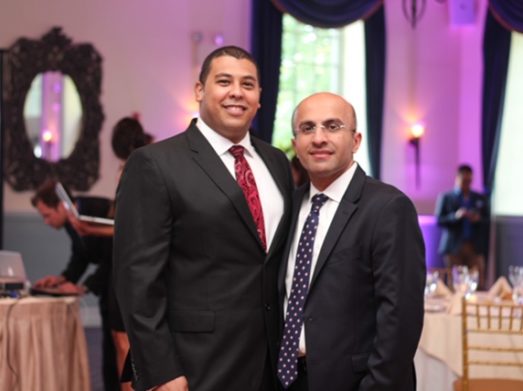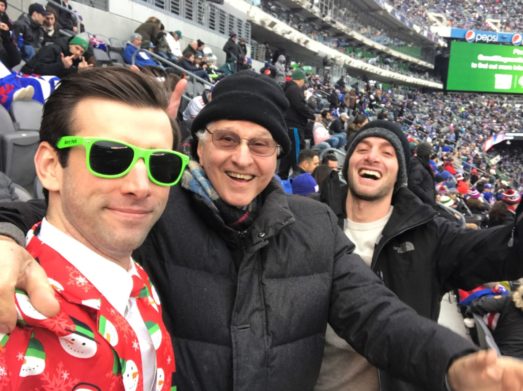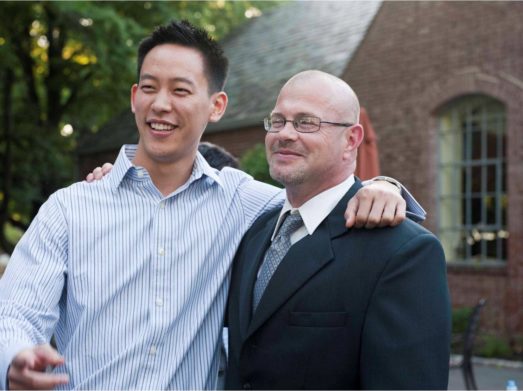Orthopedic Surgery Yearly Curriculum
The Orthopedic Surgery Residency provides education in both pediatric and adult orthopedics, including a variety of subspecialties. Our curriculum offers a wide variety of clinical and research experiences.
Curriculum
PGY-1
The PGY-1 year is under the direct supervision of the Department of Orthopedic Surgery. A diverse 12-month experience has been developed, in accordance with regulations of the American Board of Orthopedic Surgery (ABOS), to provide a balanced year.
PGY-1 residents rotate in the Orthopedic Surgery Service at Maimonides for 6 months. They are active in both the emergency room and office practices, provide pre-and post-operative patient management, as well as provide inpatient care for all orthopedic services. Residents experience a full complement of adult reconstruction, spine, foot and ankle, hand, sports medicine, and shoulder and elbow surgeries.
PGY-1 residents spend 1 month rotating in a variety of different specialties applicable to orthopedics, including anesthesia, musculoskeletal imaging, and emergency medicine. 1-month rotations are also spent in vascular surgery, trauma services, and general surgery.
A longitudinal simulation training curriculum has been developed, based on the ABOS Surgical Skills Modules. These training modules occur at our Orthopedic Simulation Laboratory to provide training in skills used in the initial management of injured patients and basic operative skills to prepare residents to participate in surgical procedures. PGY-1 residents participate in these modules for the initial 3 months of their intern year.
PGY-1 residents are provided with an orthopedic textbook to study throughout the PGY-1 year to prepare for the PGY-2 year. They are required to take the Orthopedic In-Training Examination and to pass Step 3 of the United States Medical Licensing Examination (USMLE).
PGY-2
The orthopedic residents in the 2nd year begin assuming responsibility for patient care through rotations in pediatrics (2 months), spine (2 months), sport medicine (2 months), adult reconstruction (2 months), and orthopedic trauma (4 months) with faculty who also take emergency calls. The residents work under the direct supervision of a senior resident and an individual member of the faculty on each of these rotations. The PGY-2 residents also cover orthopedic consults on all of their rotations.
The PGY-2 year is spent entirely at Maimonides. 4 months are spent in orthopedics trauma and 2 months in adult reconstructive surgery caring for orthopedic injuries. Emphasis is placed on continuity of patient care through developing skills of preoperative patient evaluation, medical optimization, and postoperative treatment planning. The resident participates in an outpatient clinic and a comprehensive operative experience.
2 months are allocated for spine surgery. The resident learns how to evaluate the spine and neurological status of the patient. They gain knowledge of both invasive and non-operative care of spinal deformities, spinal trauma, and degenerative disease for both children and adults. The resident participates in the preoperative planning, as well as the discharge management, of all patients on the spine service.
The residents also spend 2 months in pediatric orthopedic surgery working with 2 pediatric orthopedic surgeons in both hospital and private clinics. They participate in all aspects care of the child including emergency evaluation and management of orthopedic injuries.
The remaining 2 months are spent with orthopedic sport surgeons as an introduction to sport surgery. Residents will learn how to evaluate patients for non-operative and operative treatment of sport pathologies, as well as postoperative care and rehabilitation.
PGY-3
During the PGY-3 year the resident spends 2 months on the upper extremity service, where they’re exposed to all aspects of patient care for the upper extremities including the hand, wrist, elbow and shoulder. The resident attends hand clinics and rotates to the hand attending surgeons’ offices, so that continuity of care is ensured.
2 months are spent rotating on the busy orthopedic reconstruction service and 2 months on the orthopedic trauma service. Residents work closely with a group of surgeons performing total hip and knee arthroplasties. Residents will learn conservative and operative management of arthritic conditions both in the office and the operating room.
2 months are spent on the sports rotation. Residents’ surgical cases will be followed up in the clinic or office in order to assess short and long-term outcomes. Another month is spent on foot and ankle service to advance their experience on treatment of foot and ankle pathology including diabetic foot.
Residents spend another 3 months at the Connecticut Children’s Medical Center for a comprehensive experience in pediatric orthopedics. This service provides the largest outpatient pediatric orthopedic clinic experience in the state with more than 15,000 visits annually.
The resident is also given time off from clinical duties to prepare a clinical research project and present a final thesis. Residents spend 1 month on research elective working on their projects, abstracts, and publications.
PGY-4
Residents in PGY-4 assume independent patient care responsibilities under the direct supervision of the faculty. They spend 10 months at Maimonides with 2-month rotations in hand and upper extremity, pediatric orthopedics, spine, adult reconstruction/trauma, and orthopedic oncology.
Residents spend 2 months on the foot and ankle service at MedStar Union Memorial in Baltimore where they rotate with fellowship-trained surgeons who provide comprehensive care to treat the entire range of foot and ankle disorders.
PGY-5
PGY-5 is spent entirely at Maimonides. 1 resident is selected as the Executive Chief Resident. All chief residents are responsible for organizing the day-to-day operations of the service and participating with the program director to develop conference and call schedules. In the clinic, the chief resident is a resource for the junior residents and medical students. The chief resident works with the attending in the clinic, which functions in a consultative capacity, to develop a differential diagnosis, and work up a treatment plan for the patient.
In the operating room, the chief resident assumes a leadership role, developing the surgical plan and reviewing it with the other residents and attendings involved in the patient care. Rare, unusual, or exceptionally difficult surgical cases typically involve the PGY-5 resident. The resident is expected to review the literature and develop competence discussing such cases.
The PGY-4 and -5 residents are responsible for orthopedic emergency calls when they are assigned with members of the faculty. They provide back-up supervision for the PGY-2 and -3 residents who initiate the orthopedic evaluation of the injured patient. Should a patient require admission or emergent surgery, the PGY-4 or -5 resident assumes primary responsibility with immediate supervision by a member of the faculty.
Courses and conferences
Our curriculum consists of Fracture Conferences, teaching rounds, our Orthopedic Simulation Center, Orthopedic Gross Anatomic Dissection Sessions, and our Journal Club.
Residents attend Academic Affairs sponsored lectures and seminars throughout their training in a variety of topics, including research, statistics, cultural competency, sleep deprivation, substance abuse, and practice management.
Each year, at the departmental expense, the upcoming chief resident attends the American Orthopedic Association’s Resident Leadership Forum, which includes education on leadership skills and discussion of all the ACGME requirements for residency training.
In addition to local conferences, residents are also sent at Departmental expense to the following courses. These include the annual AAOS meeting and various meetings where resident research projects are accepted.
PGY-2 – AO North American Basic Principles & Techniques of Operative Fracture Management Course
PGY-4 – 1 resident will attend the American Academy of Orthopedics Annual Meeting, and 2 residents will attend The American Orthopedic Association Leadership Meeting
PGY-5 — 1 Board Review Course
Our Visiting Professors include:
- Charles R. Clark, MD
- Lew C. Schon, MD,
- Freddie H. Fu, MD, Professor and Chair, Orthopedic Surgery, University of Pittsburgh
- Amir Matityahu, MD, Director of Pelvis and Acetabular Trauma Reconstruction at San Francisco General Hospital
- Martin A. Posner, MD, Clinical Professor of Orthopedic Surgery, New York University
- Felix “Buddy” Savoie, III, MD, Chief of Sports Medicine, Tulane University School of Medicine
- Srino Bharam, MD, Director of Hip Arthroscopy, Lenox Hill Hospital

